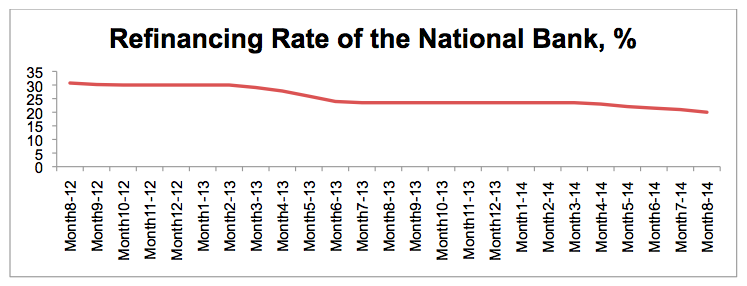Sanctions as New Opportunity, Less State Support for the Economy – Belarus Economy Digest

The National Bank continues to gradually reduce its refinancing rate. The latest reduction, which occurred in August 2014, may help make receiving financing for legal entities easier.
And yet, despite their best intentions, these steps contribute to the accumulation of macroeconomic imbalances in the country.
An analysis of the pros and cons have forced the Belarusian authorities to come up with an agreement that will normalise trade relations with Ukraine. The possibility of a real deterioration in their mutual trade relations has encouraged the officials in Minsk to push for the removal of all announced limitations imposed on Ukraine.
The introduction of food sanctions by Russia provides Belarus with a chance to accumulate foreign currency through bolstering its exports. Conversely, these developments come the risk of rising prices and food deficits on domestic market go up as well.
The existing imbalances in the economy force the authorities to reduce the amount of state support they provide and to change how it is doled out among its enterprises.
Changes in refinancing rate
In the middle of August the National Bank of Belarus (NBB) reduced its refinancing rate by 0.5 percentage points. Thus, beginning August 13, the rate will be set at 20.0%. Favourable tendencies in the monetary arena are the official reason behind the Bank's decision to reduce the rate. They have appeared in the form of a growing influx of ruble deposits from households alongside an excess currency supply in July.
A decrease in its refinancing rate will lead to a decline in the rates on ruble deposits and loans and will likely stimulate growth of demand for currency deposits. In general, these reduction measures raise concerns about growing inflation.
In January-June it was held at 19.8% and there are no reasons to expect a slowdown in the rates' growth in the near future. The potential for further inflation, combined with a decline in deposit rates and devaluation expectations, may affect the volatility of the national currency and decrease demand for it.

Decreased probability of a trade war with Ukraine
From the middle of August Belarus and Ukraine stopped using restrictive trade measures against one another. Ukraine agreed to stop collecting duties on Belarusian beer, tires, confectionary and dairy products imposed, duties that were imposed in the middle of July as a response to similar Belarusian actions. For its part, Belarus has decided to abolish restrictive instruments like licencing requirements for its Ukrainian partners.
The Ukraine-Belarus trade conflict developed after Belarus imposed licencing on beer, confectionary products, pasta and their operating supplies from outside the Customs Union and required a set minimum price level in exchange for the acquisition of a licence to be sold in Belarus.
Counter measures from the Ukrainian side forced Belarus to re-evaluate the pros and cons of a potential trade war, especially when considering the fact that Ukraine remains one its most important trading partners (one of the largest recipients of oil products exported from Belarus) and around 10% of Belarusian exports goes there.
New opportunities on the Russian market
At the beginning of August Russia imposed a ban on the importation of a range of foodstuffs from the EU and USA, which was a response to the sanctions previously introduced by the West against Russia. The restricted goods include beef, pork, poultry, fruits and vegetables, dairy and other products. This is one-year embargo opens up a number of new opportunities for Belarusian producers.
Russia introduced the sanction without negotiating with either Belarus or Kazakhstan despite the fact that they officially have equal rights as members in the Customs Union with Russia. Belarus and Kazakhstan refused to support the sanctions.
Despite Belarus' unwillingness to introduce the same sanctions in Belarus, Alexander Lukashenko agreed to protect the Russian market from re-exports of western products and at the same time requested that domestic producers raise their export production volumes in order to improve Belarus' overall trade balance. However, there are certain risks associated with raising the level of food exports, including a food deficit and rising prices in Belarus.
On the other hand, by bringing the conflict to an end and returning to normalised trade relations with Ukraine, Belarus has new opportunities in terms of its increasing its volume of exports to Russia. Belarus also has a chance to accumulate additional volumes of raw agricultural products which previously went directly to Russia.
Under these new conditions Belarus could potentially reprocess them, as well as other European food products, and send them on to the Russian market afterwards. At the moment it is unclear whether Russia will actually attempt to block these supplies or, quite the opposite, will hold a favourable opinion of Belarus' new potential role.
Industry subsidies instead of individual support
The Belarusian authorities are preparing to introduce a new instrument to stimulate growth with the state's support. According to a resolution of the Council of Ministers, the new rules of the game call for a shift from individual support to industrial subsidies.
This essentially means that only strategically important state, sectoral and regional programmes will receive state support on a competitive basis. It also assumes that enterprises of all types of ownership will have equal rights and access to these financial resources.
Given the importance of the new policy for the country's economic growth, the potential for the efficient usage of the state's support and the rate of return will the main keys to securing financing.
These changes will also affect the agricultural sector. According to Alexander Lukashenka, infrastructure, improvements in land resource management and general melioration will be the main targets of the government programme. As for agricultural enterprises, again, only strategically important projects, especially those associated with exports, will receive these special privileges.
Thanks to this process of optimisation, the total reduction in number of programmes of state financing in 2014 will amount to BYR 3.7 billion in savings. The reform, if executed, will force state enterprises to change their usual way of doing business and think about ways to improve their performance and increase their efficiency.
Maryia Akulava, Belarusian Economic Research and Outreach Center (BEROC)
This article is a part of a joint project between Belarus Digest and Belarusian Economic Research and Outreach Center (BEROC)











